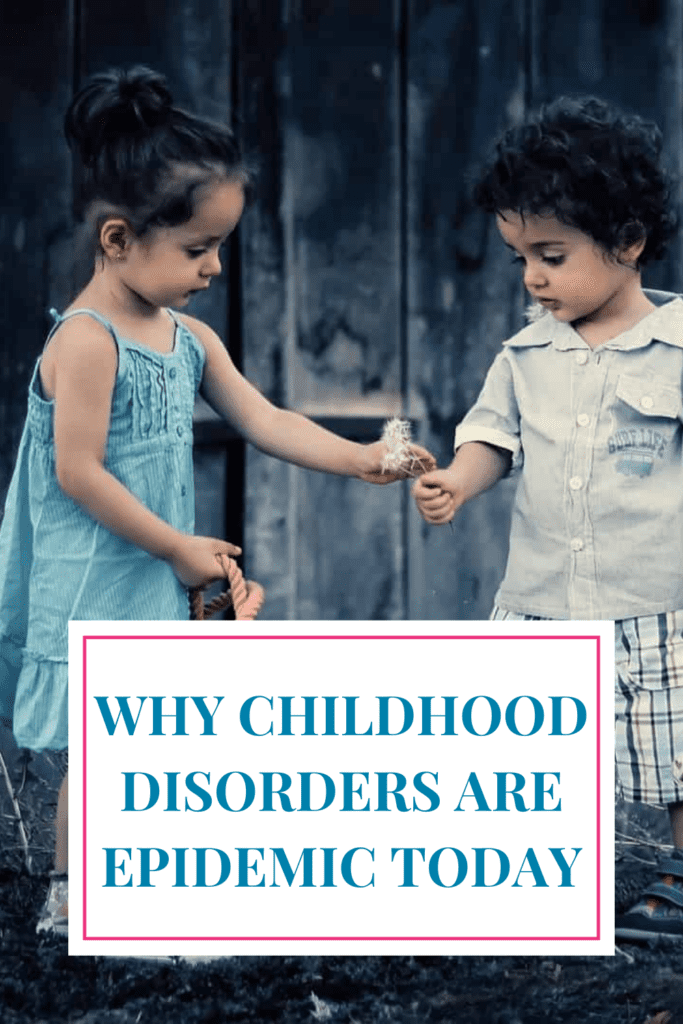Chances are if you’re reading this email, it’s because you are one of those ‘ahead-of-your-time’ mamas who understands there is so much more going on beneath the surface of your child’s struggles with learning or behaviour.
… and you also likely know there’s a lot more going on than genetics.
Consider this…
Compared to any other generation in history, children today:
- play outside less, (less vitamin D, exercise and fresh air!)
- sit more
- eat less real food (and eat a ton more processed and industrial farmed food)
- sleep less
- are over-stimulated, over-scheduled, over-stressed
- are bombarded with chemical assaults on a daily basis
- are exposed to heavy metals
…and we wonder why the kids aren’t alright?
With that in mind, we have to ask ourselves how we can even begin to be surprised that our children are not thriving like children in previous decades–decades as recent as the 1970’s.
Everyone is Talking (and it’s not good)
It doesn’t matter who you talk to–everyone’s kid is struggling with something these days. The sudden increase in childhood disorders has the attention of everyone from parents to teachers to doctors to grandparents.
Dyslexia, ADHD, autism spectrum and other learning disabilities is heartbreaking for both you as a parent and your child. If you’re like me, you likely find yourself asking what you failed to do, how you could have seen the signs sooner and what caused it?
So many moms tell me they read all the books, followed all the ‘rules’ and their child still has difficulties.
But let’s talk about why the increase…
In order to get real solutions that work, the first step lies in understanding why childhood disorders have increased so greatly in the last the last few decades. Research has found that it often starts in the gut.
It’s Not in the Brain – Not Really
Neurologist, Dr. Natasha Campbell McBride, author of the ground-breaking book, The Gut and Psychology Syndrome, explains that in her early years of practice she began noticing that the children she saw more frequently had numerous, seemingly unrelated health conditions: ADHD combined with eczema, allergies, hay fever or asthma or ADHD and dyslexia and half of all dyslexic children were also had dyspraxia.
She learned through research and investigation and from years of working with children, including her own autistic son, that these conditions were merely boxes that modern medicine had created with the best of intentions—to better understand, diagnose and treat.
Get to the ROOT CAUSE!
The underlying cause of these overlapping conditions is the gut-brain axis. Dr. Campbell-McBride rarely saw a child with cognitive disorders not have some kind of health issue related to digestion and immune function. Gut dysbiosis, pale, pasty skin and anemia are commonplace among autistic children as well as children with other cognitive disorders.
The Kids Aren’t Alright
Thirty years ago 1/10,000 children had autism. When Dr. Campbell-McBride researched and wrote her book almost thirty years ago the autism statistics was 1/150. Today, 1/65 children are diagnosed with autism. In some areas, the rates are as high as 1 in 50 and that number is expected to be 50% by 2030.
Recently, a mother of a child with several cognitive disorders spoke out and commented that if these statistics were cancer, polio or rubella then it would be a national emergency.
That is a staggering number for many of us, but ask a senior teacher and they will tell you they aren’t surprised. They will tell you that in their last ten to fifteen years of teaching they have never seen so many kids who are struggling with cognitive disorders. They will tell you the kids have changed.
Of course, there has always been children with cognitive problems, and awareness has certainly increased the rate of diagnosis, but it does not explain the sudden epidemic of childhood brain disorders.
Remember when we used to eat peanut butter sandwiches at school because peanut allergies were so rare? Now they’re not. In fact, anaphylactic food allergies are epidemic as well. Our children are definitely sicker on a bio-chemical level.
So what is happening to our children?
What’s Wrong With our Modern Lifestyles?
In a nutshell, much of our modern lifestyle is artificial and totally contrary to the way we evolved, developed and lived for four million years. Believe me, I love progress as much as the next person–could you even imagine life without a washing machine, let alone Netflix?
I can assure you that I am not suggesting we find a cave and camp out there permanently. However, we have strayed a little too far from our roots–even from those of our grandparents and parents and it’s the culmination of these factors that have led us into this mess of epidemic auto-immune conditions and brain disorders.
The Role of Genetics
While genetics can certainly influence our predisposition to certain illnesses and disorders, there is a mountain of evidence that ‘genetics influence, but that environment determines’. In fact, it is a whole new science–called epigenetics–the science of how our genes turn on and off according to our environment. Furthermore, genes cannot account for the fact that before twenty five years ago most family doctors had never seen a single case of autism.
The Paradox of Advancement – One Step Forward, Two Steps Back
Our modern lifestyles, from our inventions to our habits, have been lifesavers–literally! They have allowed us more free-time, provided us with longer lives, more choice and greater experiences. However, our advances have at times gotten in the way and even altered our biology. This divorce from the rhythms and habits from which we evolved can be detrimental to disastrous.
This sounds bleak – I know. But it’s not. You don’t even need to time travel to restore your child’s brain and body health. It’s all about making simple changes that bring you and your family back to their roots – one step at a time.
This might seem far-fetched until you consider the countless families that have done just that and watched their children make incredible gains and overcome supposedly insurmountable limitations. I know because my daughter is one of those kids. But that’s a story for another day.
Do you suspect your child’s difficulties could be from ‘too much change, too fast’? If so, book a free call so we can chat about building a better brain through simple changes that don’t require hours of your time.


